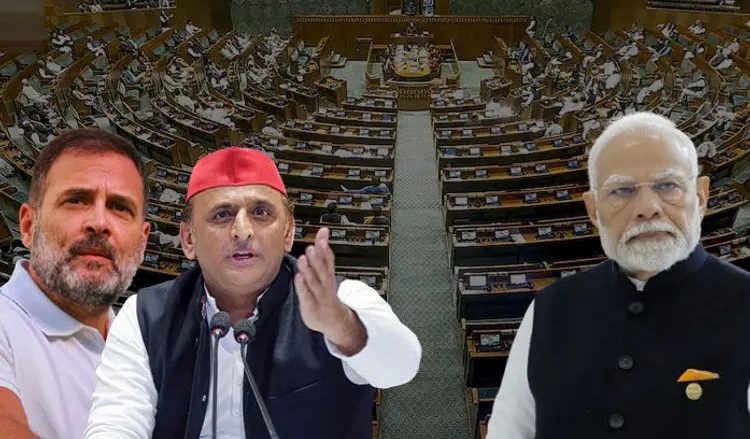
One Nation One Election Bill: The bill related to ‘One Nation, One Election’ has been introduced in the Lok Sabha today. Union Law Minister Arjun Ram Meghwal has presented this bill in the House. This bill has been named ‘Constitution (129th Amendment) Bill 2024’. Now reactions of all political parties regarding this bill have also started coming forward.
strong opposition from the opposition
Congress called an emergency meeting this morning. The opposition is continuously opposing ‘one country, one election’. At present, today’s proceedings in the Lok Sabha are going on in a very noisy manner. SP President Akhilesh Yadav has announced the protest. He said, ‘This is another conspiracy to destroy the Constitution.’
What is one country one election?
‘One country, one election’ means holding all types of elections simultaneously across the country on the same day (or in a shorter period). In the context of India, along with the Lok Sabha elections, assembly elections of all the states are also to be held. Along with this, elections should also be held for local bodies i.e. Municipal Corporation (Municipal Corporation), Municipality, Nagar Panchayat and Gram Panchayat. A system where all elections are held on the same day or within a fixed time frame of a few days is called ‘one country, one election’ i.e. ‘one country-one election’.
PM Modi advocated ‘one nation, one election’
Elections are being held every night in the country. Frequent elections hinder development. That is why Prime Minister Narendra Modi is insisting on holding state assembly elections along with the Lok Sabha elections. The Prime Minister had also advocated ‘one nation-one election’ in his speech from the Red Fort during the Independence Day celebrations on August 15 this year. He requested all the political parties of the country to move forward in this direction for the progress of the country.
Benefits of ‘One Country, One Election’
1. Cost Reduction: The biggest advantage of ‘One Nation, One Election’ is that it will reduce the cost of elections. A huge amount of money is spent in conducting separate elections every time. If elections are held at the same time in the entire country, then the expenditure will also have to be done at the same time.
2. There will be less burden on the system: Frequent elections put a burden on the administration and security forces, because they have to perform election duty every time. The problem of accommodation, food and transportation of election workers will also be resolved immediately.
3. Attention will be given to development work: If the elections end together, then the central government and state governments will be able to focus on work. Parties will not come into election mode again and again and will be able to focus on development work.
4. Increase in the number of voters: Holding elections on the same day will also increase the number of voters, as they will not feel that elections are coming again and again, otherwise they will vote in the next election. When they get a chance to vote once in five years, voters will not let it go and will show interest in electing their representatives.
Challenges against ‘one country, one election’
1. Constitutional changes necessary: The biggest challenge in implementing ‘one nation-one election system’ is the change in the constitution and laws. After amending the Constitution, it will have to be ‘passed’ in the state assemblies.
2. What if the government is dissolved?: If for some reason the Lok Sabha or the State Assembly is dissolved, how is the ‘one nation, one election’ system to be maintained? If the government of one state is dismissed, then can’t the governments of all the states be canceled and elections held in the entire country?
3. Lack of resources: In our country, elections are conducted through EVMs and VVPATs, the number of which is limited. At present, since Lok Sabha and Assembly elections are held separately, whatever resources are available can be met, but if all types of elections are held simultaneously across the country, then where will the resources required for the elections come from? What should be done if there is a shortage of administrative officers and security personnel?
 look news india
look news india